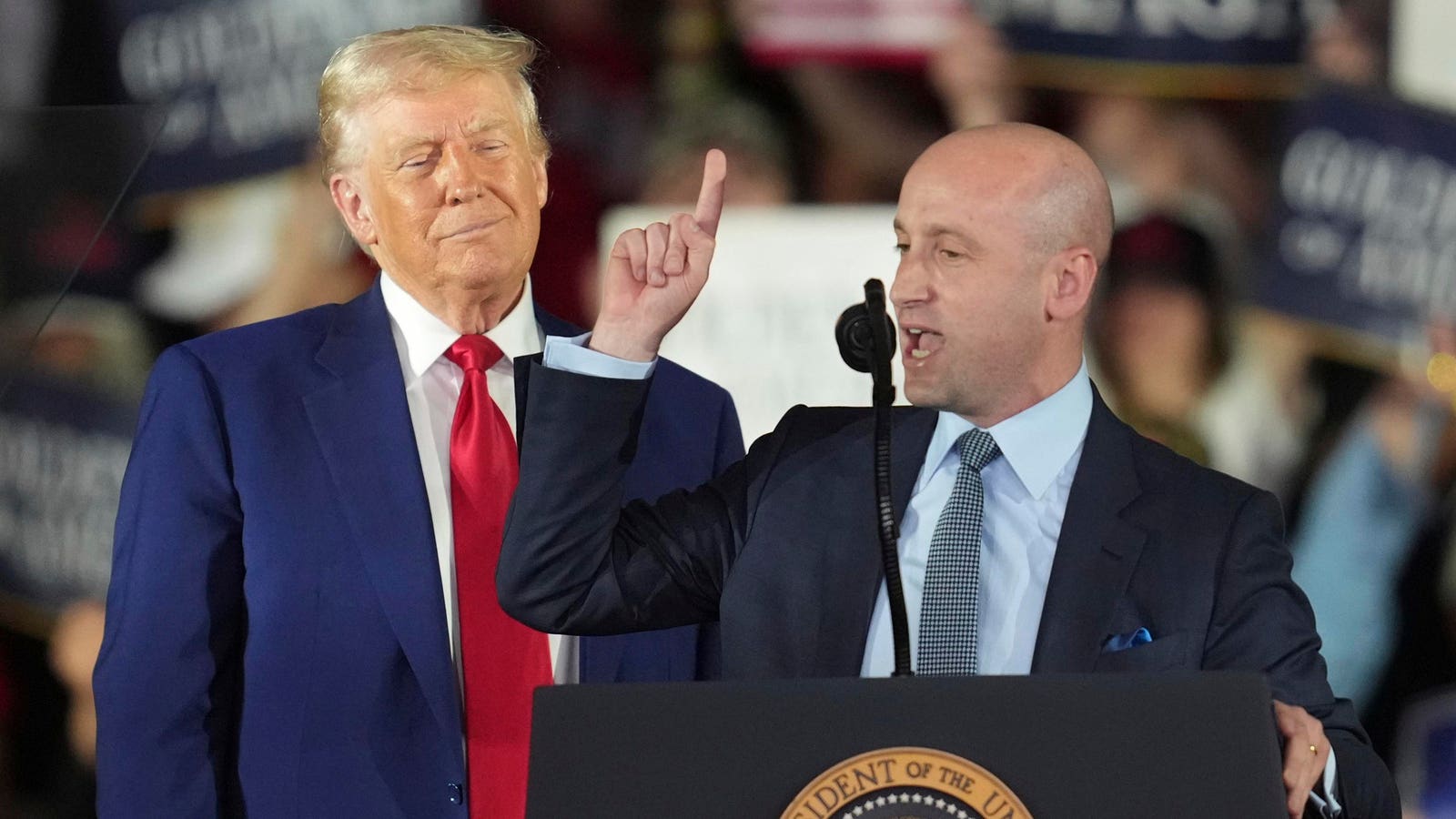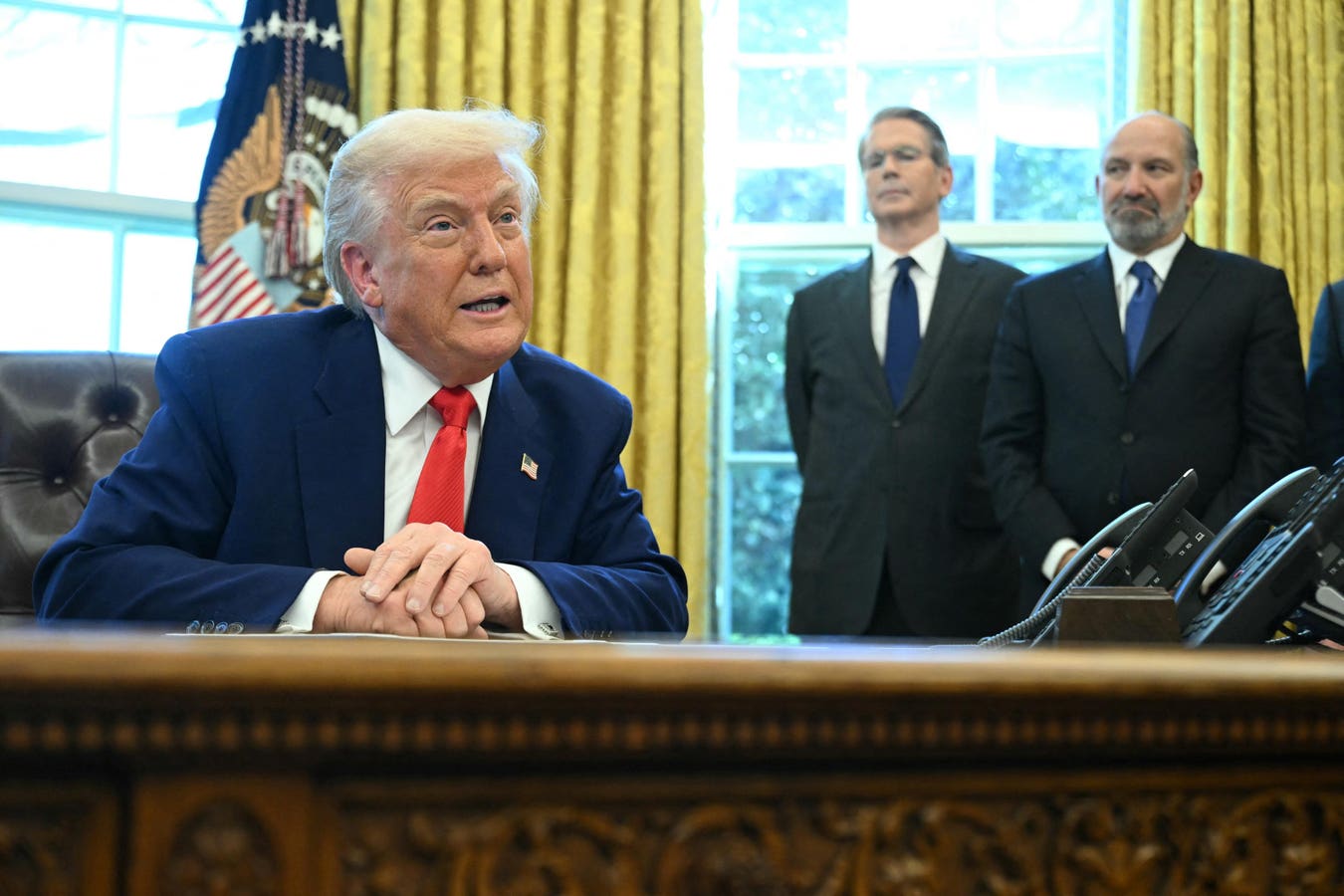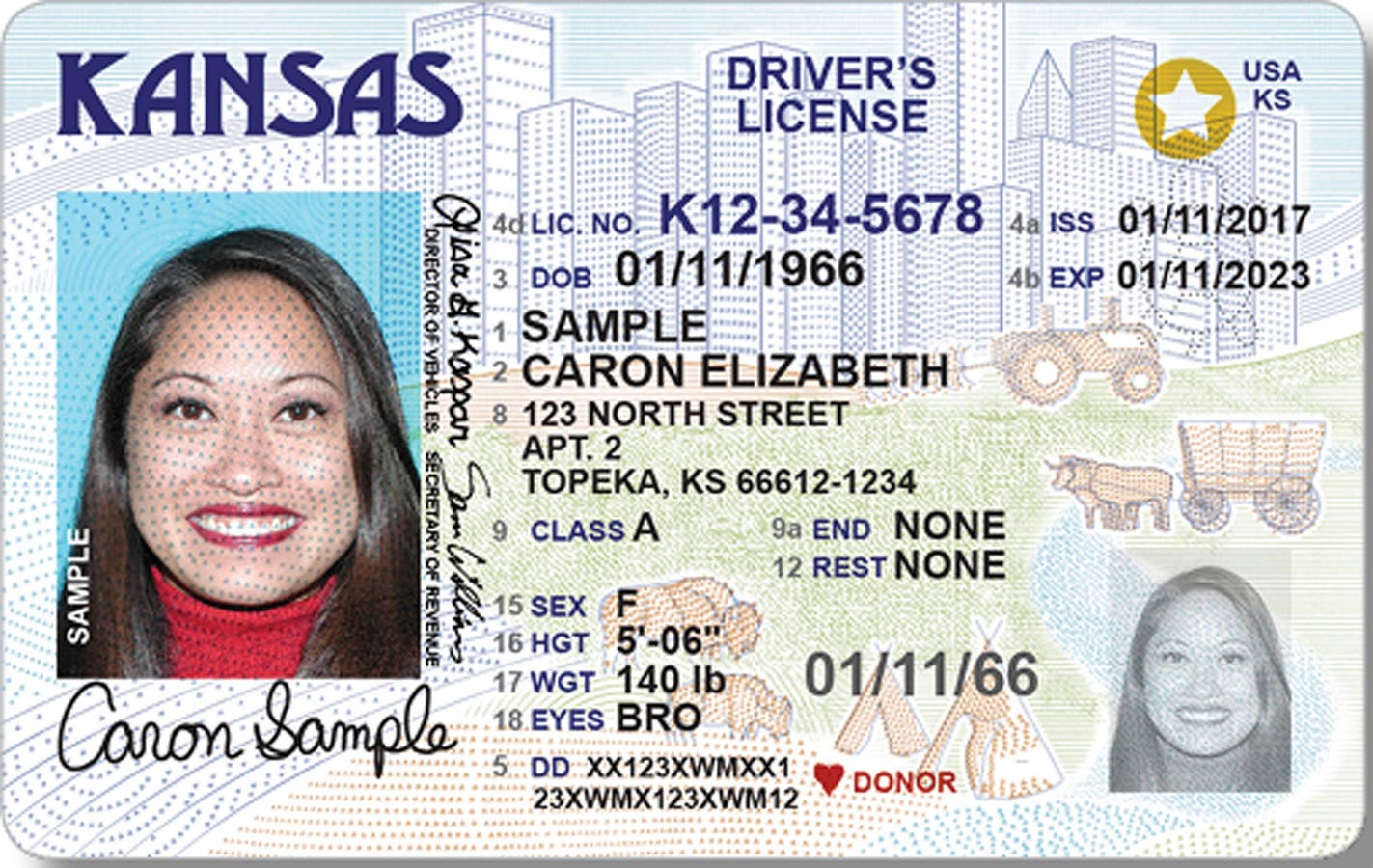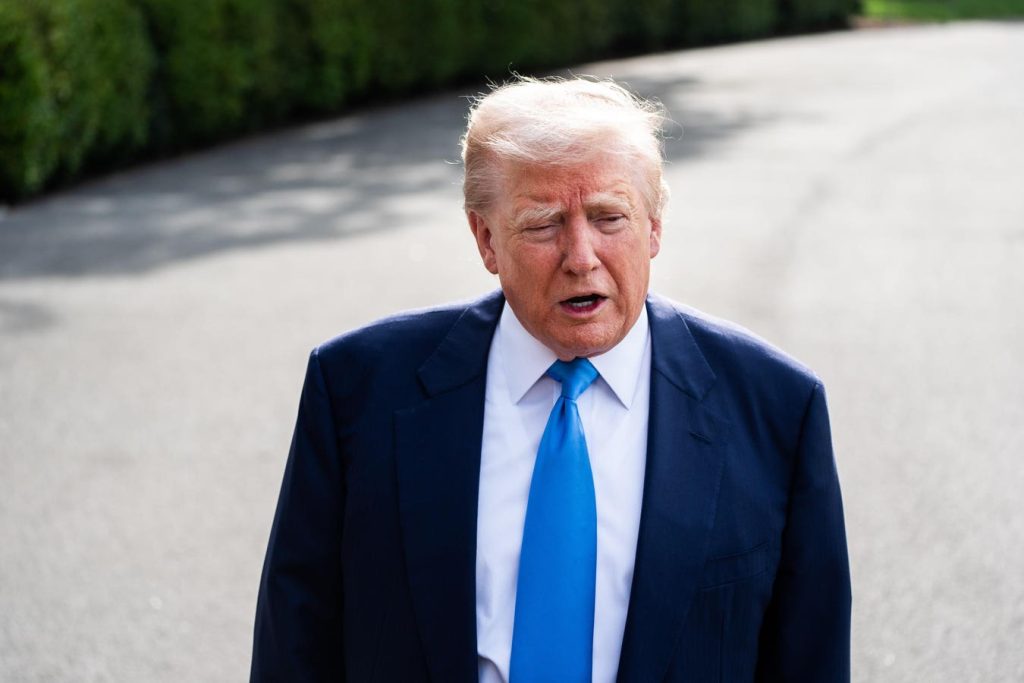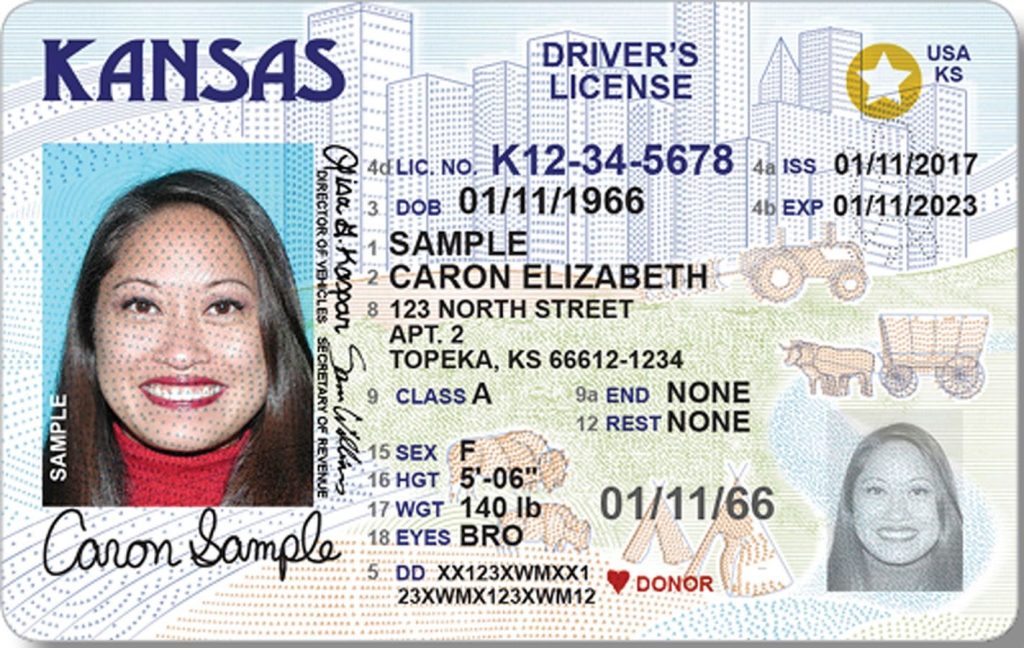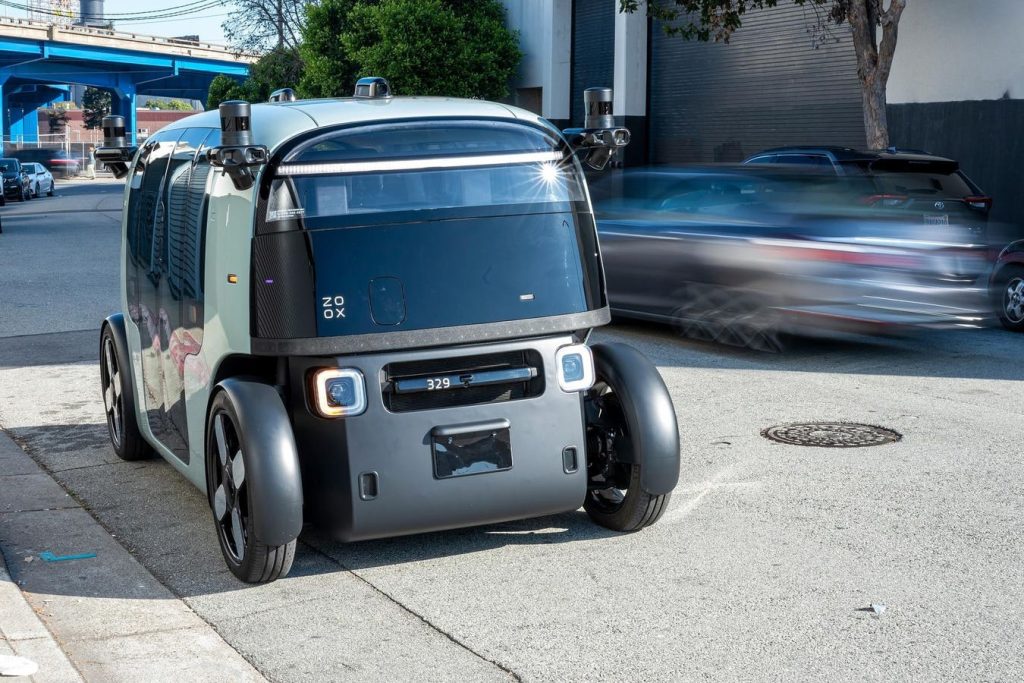Topline
President Donald Trump and top adviser Stephen Miller have suggested in recent days immigrants may not be entitled to “due process” in the courts before they’re deported—which clashes with decades of legal precedent granting due process protections to immigrants and comes as the Trump administration has often deported people without hearings or allegedly in violation of court orders.
President Donald Trump and adviser Stephen Miller speak at Macomb County Community College Sports … More Expo Center on April 29 in Warren, Mich.
Key Facts
In an interview that aired Sunday, Trump told “Meet the Press” he “[didn’t] know” whether he had to uphold the Constitution when it came to deportations.
Host Kristen Welker pointed to the Fifth Amendment, which says “no person” may be “deprived of life, liberty, or property, without due process of law”—meaning people must have their cases heard in court, with the right to make their case and defend themselves.
Trump responded that while the Constitution “might say that,” that would mean “we’d have to have a million, or 2 million, or 3 million trials.”
Miller, an architect of Trump’s hardline immigration policies, claimed on X on Monday that due process does not extend to undocumented immigrants, alleging, “The right of ‘due process’ is to protect citizens from their government, not to protect foreign trespassers from removal” and “due process guarantees the rights of a criminal defendant facing prosecution, not an illegal alien facing deportation.”
Those comments conflict with longstanding legal precedent dictating immigrants do have due process rights granting them legal protections from being automatically deported, with conservative Supreme Court Justice Antonin Scalia writing for the court in 1993, “It is well established that the Fifth Amendment entitles aliens to due process of law in deportation proceedings.”
Immigrants who have entered the U.S., “even illegally, may be expelled only after proceedings conforming to traditional standards of fairness encompassed in due process of law,” the Supreme Court similarly ruled in 1953.
Crucial Quote
Trump claimed on “Meet the Press” he doesn’t know whether or not he has to follow due process regarding deportations, saying he’s “not involved in the legality or the illegality, I have lawyers for that.” The president lamented not being able to immediately deport “thousands” of immigrants whom he claimed are “some of the worst, most dangerous people on Earth,” however, adding, “I was elected to get them the hell out of here, and the courts are holding me from doing it.”
Contra
Trump and Miller’s comments contrast with Secretary of State Marco Rubio, who told “Meet the Press” in April that “of course” all people in the U.S. are entitled to due process.
What Due Process Rights Do Immigrants Facing Deportation Have?
Past court rulings have found migrants facing deportation do have the right to due process and a “full and fair” hearing in which they can make their case for being allowed to stay in the U.S., though judges have noted they do not have “the same bundle of constitutional rights afforded defendants in criminal proceedings.” “Immigration proceedings are impartial proceedings where petitioners may make their case, but are not entitled to the [immigration judge’s]
legal assistance in doing so,” like having the judge advise them about the possibility of being granted asylum, the 9th Circuit Court of Appeals noted in 2021. “Where an alien is given a full and fair opportunity to be represented by counsel, to prepare an application for … relief, and to present testimony and other evidence in support of the application, he or she has been provided with due process,” the same court ruled in 2007.
What To Watch For
The Trump administration is embroiled in controversies over its mass deportation plans—and whether specific deportations were unlawful—that are playing out in court. The Trump administration has still not returned Kilmar Abrego Garcia, a Maryland man whom the government has conceded was accidentally deported to El Salvador, despite the Supreme Court ruling the administration must “facilitate” the man’s return. The Trump administration has claimed it can’t return Garcia because he’s under El Salvador’s control now, but said it’s complying with the Supreme Court because authorities would send a plane if El Salvador was willing to release him. Trump told “Meet the Press” he would consider going back to the Supreme Court and asking it to clarify its ruling, and he is deferring to the Justice Department on how to handle the case. Lawyers are also pushing at a hearing Tuesday for the Trump administration to release another man, identified as Daniel Lozano-Camargo, who was deported to El Salvador despite a previous legal settlement forbidding it. The deportations of migrants to El Salvador has been a major point of contention, as many people were deported and imprisoned in the country despite both an apparent lack of due process and evidence suggesting many of those deported did not have ties to criminal group Tren de Aragua, as the government claimed. Judge James Boasberg ruled it’s likely the Trump administration committed criminal contempt by deporting the migrants despite a court order forbidding it, and a federal judge ruled last week the government cannot deport any more people under the law Trump used to justify those deportations.
Chief Critic
Immigration lawyers have strongly decried the Trump administration’s comments opposing due process for migrant deportations, as well as the government’s deportations of migrants like Garcia, whom immigration attorney Kate Lincoln-Goldfinch told “Forbes Newsroom” had “no due process. Zero, whatsoever.” “And I think what’s scary about that, is if they can pick him up off the street and deport him into a lifelong prison sentence in another country without due process, who’s next?” Lincoln-Goldfinch added. “And really, nobody should feel safe if this is allowed to go on.”
Key Background
Mass deportations have long been a cornerstone of Trump’s agenda, with the president promising before taking office to carry out the largest mass deportation effort in U.S. history. The president has aggressively tried to oust immigrants from the country since his inauguration—including through such methods as imprisoning migrants in El Salvador, trying to cancel student visas and luring immigrants with $1,000 payments if they self-deport. The efforts have run up against numerous legal challenges, however, and cases like Garcia’s and Boasberg’s accusations of contempt come amid broader fears of the Trump administration defying the rule of law. Trump officials like Vice President JD Vance have suggested judges should not be “allowed” to constrain Trump’s executive actions, and the president and his allies have lashed out against judges who have ruled against him and suggested they should be impeached. The administration has insisted it has never intentionally violated a court order, however, and Trump has repeatedly said he would not defy an order from the Supreme Court.
Further Reading
ForbesHas Trump Administration Sparked A Constitutional Crisis? This Is Why His Critics Are WorriedBy Alison Durkee
ForbesTrump Administration Likely Committed Criminal Contempt With El Salvador Flights, Judge RulesBy Alison Durkee
ForbesImmigration Attorney Explains Kilmar Abrego Garcia’s Rights Under Withholding Of Removal OrderBy ForbesTV
ForbesThe Conspiracy Behind Kilmar Abrego Garcia’s Tattoos Explained—After Trump Insists Doctored ‘MS-13’ Ink Is RealBy Sara Dorn

